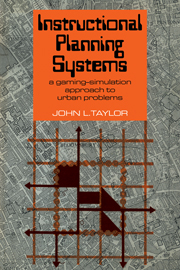Book contents
- Frontmatter
- Contents
- List of figures, tables and forms
- Acknowledgements
- 1 Point of departure
- 2 The basis for discussion
- 3 The genesis of an approach
- 4 Selected planning developments
- 5 Impact, pitfalls and pay-offs
- 6 A gaming-simulation rationale
- 7 Simulation in practice
- 8 The way ahead
- Appendices
- Bibliography
- Index
5 - Impact, pitfalls and pay-offs
Published online by Cambridge University Press: 07 May 2010
- Frontmatter
- Contents
- List of figures, tables and forms
- Acknowledgements
- 1 Point of departure
- 2 The basis for discussion
- 3 The genesis of an approach
- 4 Selected planning developments
- 5 Impact, pitfalls and pay-offs
- 6 A gaming-simulation rationale
- 7 Simulation in practice
- 8 The way ahead
- Appendices
- Bibliography
- Index
Summary
Prompted by increasing and changing demands placed upon planning education and the emergence of a promising new instructional technique, the writer set out to examine a gaming-simulation approach to the urban development process. Since it is believed that gaming models have some pedagogic potential for planners and yet for almost a decade have lacked anything by way of comprehensive assessment, this chapter seeks to establish a clearer mental perspective on the nature of the technique in relation to the extent of its impact and potential usefulness.
THE LEVEL OF COMMITMENT
Few stock-taking assessments of the employment of instructional simulation systems in differing subject areas are known to the writer. Without exception, all commitment appraisals appear to have dealt with the field of business and management studies. Here the surveys of Dale and Klasson (1964), drawing upon 90 informants, and Shubik (1968), relying upon 48 respondents, provide useful insights into the nature of business gaming, its development, dissemination and utilization. The only comparable work undertaken in relation to urban studies programmes appears to be that recently carried out by the writer (Taylor 1969a) relying upon 70 questionnaire responses received, very largely, from European and North American architectural and planning schools. In the paragraphs which follow, some of the findings from this utilization survey and the resulting directory of urban development games are summarized as a preface to brief descriptions of more localized validation studies to be found in the literature.
- Type
- Chapter
- Information
- Instructional Planning SystemsA Gaming-Simulation Approach to Urban Problems, pp. 54 - 73Publisher: Cambridge University PressPrint publication year: 1971



